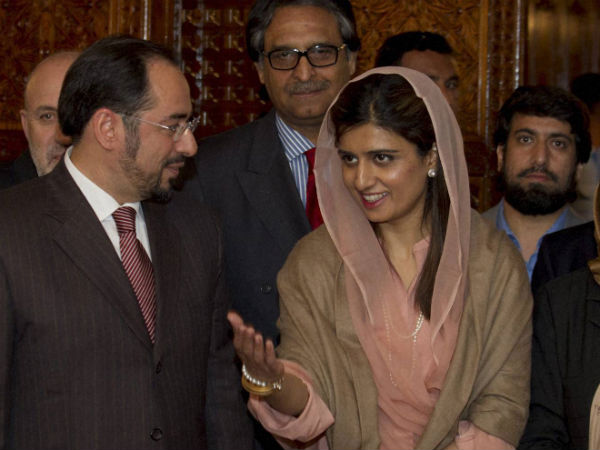
3 quick jolts: Does Pak glamour minister have any clue?
Pakistan's Foreign Minister Hina Rabbani Khar said in the USA on Tuesday that it was India which was promoting a war-like situation while her country remained loyal to peace and amity. The glamorous foreign minister's words uttered in the USA explain one thing clearly, i.e., the top leadership of Pakistan either has no connection with the reality or it lives in a serious state of hopelessness.
Khar's belief that the border problem has become a fodder for India's domestic politics and that Pakistan doesn't milk hostile narratives for political gains is a grossly mistaken one. The Pakistani foreign minister was found to be giving bizarre replies when asked about the Army Chief Ashfaq Kayani's describing the Haqqani group as a 'strategic asset' or the rampant corruption prevalent in Pakistan. She said Kayani does not think that way now or that India also had corruption problems.

The foreign minister represents a marginalised political class that is struggling to remain afloat in a country, which is on the edge. To say, India needs border issues with Pakistan to feed its domestic politics is a laughable logic. Does Khar have any idea of what's happening in her own country?
Pakistan, in the last couple of days, has received three big jolts in its internal politics and a border flare-up could make things ideal for the failed state system to divert all attention so that it can find some more days to live.
The first blow came when Islamabad imposed Governor's rule in the troubled Balochistan province following the twin bomb blasts on Jan 10 that killed several people besides injuring many. Prime Minister Raja Pervez Ashraf made the announcement of proclaiming emergency on Jan 13 after holding talks with the Hazara Shia leaders who demanded dismissal of the provincial government.
In 2012, around 500 Shias, mostly from the Hazara community, were killed in the province. But the fact that the national government in Pakistan is a weak entity was seen on Jan 15 when the Baloch assembly unanimously adopted two resolutions rejecting the Governor's rule, saying it was undemocratic, and called for a judicial inquiry into the bomb blasts.
Those opposing the imposition said it was a part of the conspiracy of the national government and the bureaucracy. They said the provincial government was ousted for it was trying to resist corruption in copper-cum-gold mining project and also accused the bureaucracy of trying to establish 'Punjab Raj' in Balochistan.
The second blow is Dr Tahirul Qadri's massive protest and call for a change in the country. The cleric, who returned to Pakistan from Canada in December, has attacked the state system and has asked for a complete overhauling of the 'crumbling system'. Political circles suspect that the mysterious rebel might have the backing of the army, the eternal power structure in the country, for the latter might try to interfere in the nation's politics in a covert manner. For, at a time when the country's elected government is nearing to complete its tenure, the first time-ever in the country's history, a direct coup to save the country from the failed civilian rulers could earn the army more brickbat than bouquet.
And then comes the third jolt, i.e., the Supreme Court's order to arrest the Prime Minister for indulging in corrupt activities in the capacity of the country's water and power minister three years ago. The 'judicial coup', which many see as an attempt to derail democracy in Pakistan, could not have at a more apt time for Qadri. The protester even said that the court's order and the imposition of the governor's rule in Balochistan showed that his protest was paying off. It is indeed a strange coincidence that all these incidents occurred at the same time and in each case, it is the civilian power centre at Islamabad which is at the receiving end.
Khar said that the cleric was a troublemaker who could be arrested but the problem with the rulers in Islamabad is that it has zero reliability among the electorate despite completing five years in office and as its tenure is nearing its end, every other power centre is attacking it. The spill-over effect is touching the borders and its eastern neighbour as well.
There is little chance that Pakistan will go to a war against India at this moment for its domestic turmoil has already left it exhausted. The western border is turning more and more restless and the situation there will be very much uncertain once the Americans start pulling out their troops of Afghanistan.
There is little hope that a vacuum created there after the pull-out will be filled up by Pakistan for it is engaged in its own fight for survival. The Chinese will not show much interest in backing Pakistan for it is tied up with the American ambitions in east Asia and arch-rivals Japan. It will also not compromise on the question of terrorism for it has also tasted the bitter pill. The US-Pakistan relation has touched the nadir.
Islamabad has clearly run out of friends, both at home and abroad. The army, may be, is trying to make a back-door entry and finding an ally in the ambitious judiciary. The decision-makers in foreign policy are trying to engage with India to make a last-ditch effort to meet the electoral challenges by raising a nationalist cry. But whatever it is, too many things are happening in that fragile nation and it is beyond the capacity of a tainted and weak leadership to plug all the holes.


 Click it and Unblock the Notifications
Click it and Unblock the Notifications


































